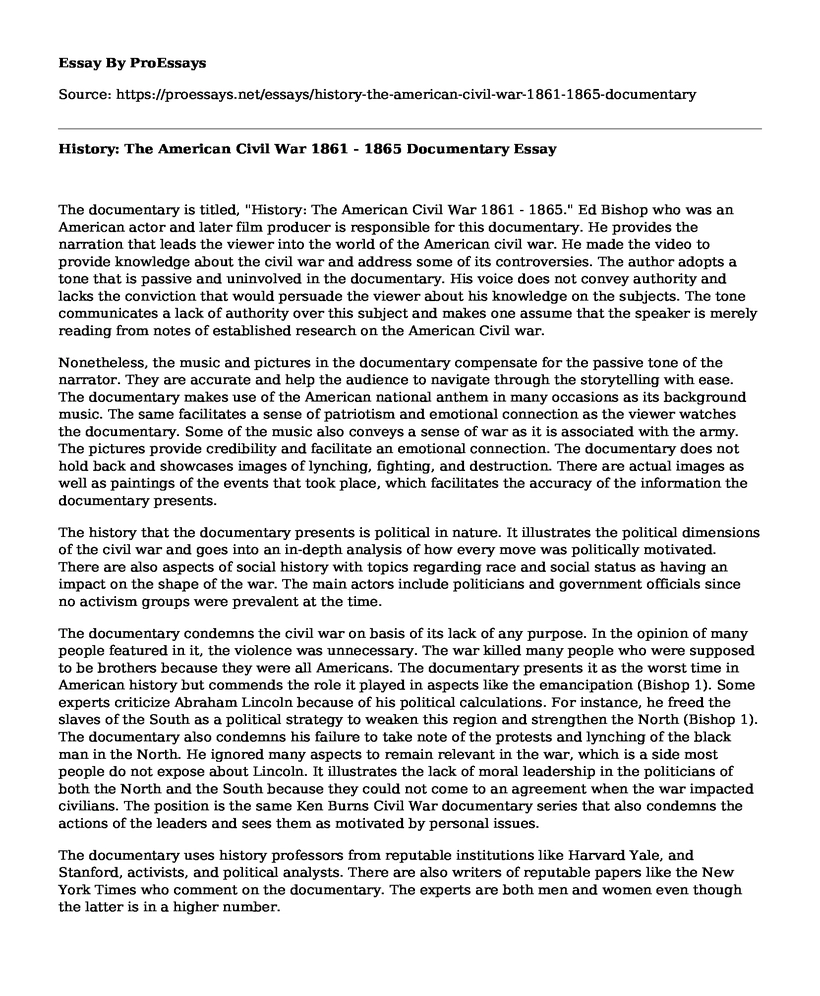The documentary is titled, "History: The American Civil War 1861 - 1865." Ed Bishop who was an American actor and later film producer is responsible for this documentary. He provides the narration that leads the viewer into the world of the American civil war. He made the video to provide knowledge about the civil war and address some of its controversies. The author adopts a tone that is passive and uninvolved in the documentary. His voice does not convey authority and lacks the conviction that would persuade the viewer about his knowledge on the subjects. The tone communicates a lack of authority over this subject and makes one assume that the speaker is merely reading from notes of established research on the American Civil war.
Nonetheless, the music and pictures in the documentary compensate for the passive tone of the narrator. They are accurate and help the audience to navigate through the storytelling with ease. The documentary makes use of the American national anthem in many occasions as its background music. The same facilitates a sense of patriotism and emotional connection as the viewer watches the documentary. Some of the music also conveys a sense of war as it is associated with the army. The pictures provide credibility and facilitate an emotional connection. The documentary does not hold back and showcases images of lynching, fighting, and destruction. There are actual images as well as paintings of the events that took place, which facilitates the accuracy of the information the documentary presents.
The history that the documentary presents is political in nature. It illustrates the political dimensions of the civil war and goes into an in-depth analysis of how every move was politically motivated. There are also aspects of social history with topics regarding race and social status as having an impact on the shape of the war. The main actors include politicians and government officials since no activism groups were prevalent at the time.
The documentary condemns the civil war on basis of its lack of any purpose. In the opinion of many people featured in it, the violence was unnecessary. The war killed many people who were supposed to be brothers because they were all Americans. The documentary presents it as the worst time in American history but commends the role it played in aspects like the emancipation (Bishop 1). Some experts criticize Abraham Lincoln because of his political calculations. For instance, he freed the slaves of the South as a political strategy to weaken this region and strengthen the North (Bishop 1). The documentary also condemns his failure to take note of the protests and lynching of the black man in the North. He ignored many aspects to remain relevant in the war, which is a side most people do not expose about Lincoln. It illustrates the lack of moral leadership in the politicians of both the North and the South because they could not come to an agreement when the war impacted civilians. The position is the same Ken Burns Civil War documentary series that also condemns the actions of the leaders and sees them as motivated by personal issues.
The documentary uses history professors from reputable institutions like Harvard Yale, and Stanford, activists, and political analysts. There are also writers of reputable papers like the New York Times who comment on the documentary. The experts are both men and women even though the latter is in a higher number.
The language used in this documentary is dry and intellectual. The experts state facts and make their arguments in a manner that is completely devoid of drama. The voice over is dry and does not engage the viewer in any intellectual critical thinking as it is the case with the Ken Burns Civil War documentary series. In the latter, the narrator has an authoritative voice that asks the viewer important questions and implores them to think deeply about the issues surrounding the civil war. The narrator in the Ken Burns Civil War documentary series is part of the discussion while the case is different with the Ed Bishop one because everything is left to the interviewees. He merely narrates historical facts while they perform the analysis, which is not the approach used by Ken Burns.
Works Cited
Ed Bishop (Director).. History: The American Civil War 1861 - 1865 The Complete Documentary [Video file]. (2015, August 18) Retrieved from https://www.youtube.com/watch?v=iDC8XAh-DIc
Cite this page
History: The American Civil War 1861 - 1865 Documentary. (2022, May 15). Retrieved from https://proessays.net/essays/history-the-american-civil-war-1861-1865-documentary
If you are the original author of this essay and no longer wish to have it published on the ProEssays website, please click below to request its removal:
- True Photographs and False Memories Essay
- Your Lie in April Essay
- Essay Example on Thomas Jefferson: Founding Father of Revolutionary Age in America
- Essay Example on Love Knows No Boundaries: Get Out, A Horror Movie
- Essay Example on Greek Games & Sports: Exploring Ancient History
- Essay Sample on Civil War Ends With Robert E. Lee's Last Attempt at Gettysburg
- Streetcar Named Desire by Tennessee Williams - Essay Sample







